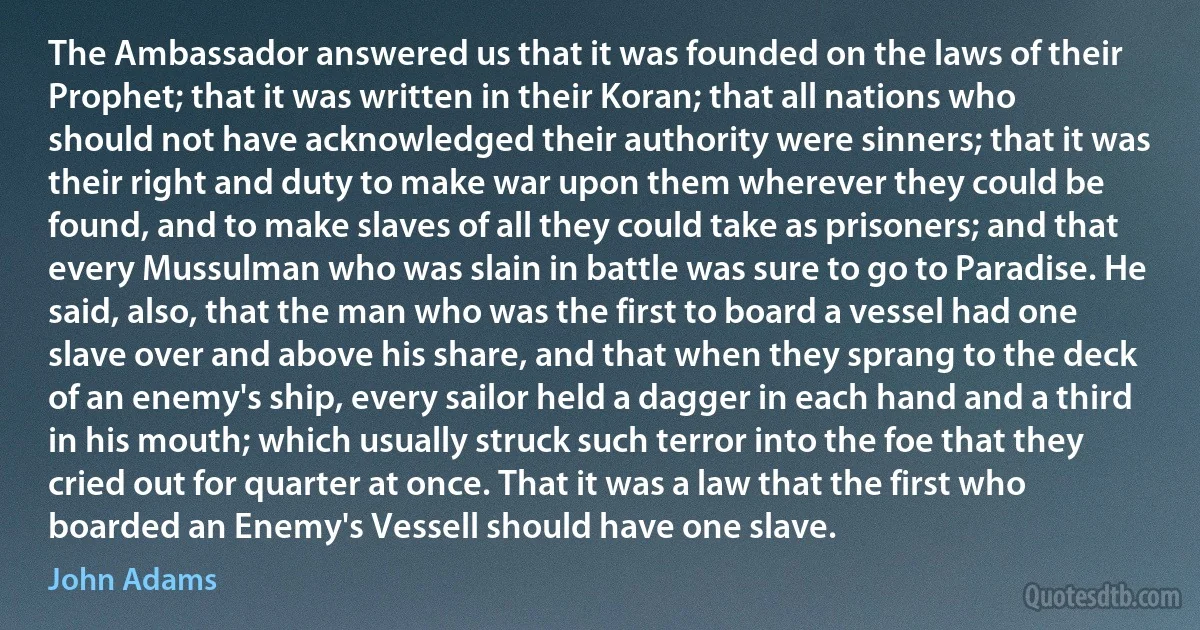
The Ambassador answered us that it was founded on the laws of their Prophet; that it was written in their Koran; that all nations who should not have acknowledged their authority were sinners; that it was their right and duty to make war upon them wherever they could be found, and to make slaves of all they could take as prisoners; and that every Mussulman who was slain in battle was sure to go to Paradise. He said, also, that the man who was the first to board a vessel had one slave over and above his share, and that when they sprang to the deck of an enemy's ship, every sailor held a dagger in each hand and a third in his mouth; which usually struck such terror into the foe that they cried out for quarter at once. That it was a law that the first who boarded an Enemy's Vessell should have one slave.
John AdamsRelated topics
above authority battle cry duty found foe hand hold koran law man mouth once paradise prophet right say should share ship slave spring strike sure take third vessel war write lawsRelated quotes
What we're after is to remind ourselves that we didn't come to Anarres for safety, but for freedom. If we must all agree, all work together, we're no better than a machine. If an individual can't work in solidarity with his fellows, it's his duty to work alone. His duty and his right. We have been denying people that right. We've been saying, more and more often, you must work with the others, you must accept the rule of the majority. But any rule is tyranny. The duty of the individual is to accept no rule, to be the initiator of his own acts, to be responsible. Only if he does so will the society live, and change, and adapt, and survive. We are not subjects of a State founded upon law, but members of a society founded upon revolution. Revolution is our obligation: our hope of evolution.

Ursula K. Le Guin
A genuine first-hand religious experience like this is bound to be a heterodoxy to its witnesses, the prophet appearing as a mere lonely madman. If his doctrine prove contagious enough to spread to any others, it becomes a definite and labeled heresy. But if it then still prove contagious enough to triumph over persecution, it becomes itself an orthodoxy; and when a religion has become an orthodoxy, its day of inwardness is over: the spring is dry; the faithful live at second hand exclusively and stone the prophets in their turn. The new church, in spite of whatever human goodness it may foster, can be henceforth counted on as a staunch ally in every attempt to stifle the spontaneous religious spirit, and to stop all later bubblings of the fountain from which in purer days it drew its own supply of inspiration.

William James
Being true is different from being taken as true, whether by one or by many or everybody, and in no case is it to be reduced to it. There is no contradiction in something's being true which everybody takes to be false. I understand by 'laws of logic' not psychological laws of takings-to-be-true, but laws of truth. ...If being true is thus independent of being acknowledged by somebody or other, then the laws of truth are not psychological laws: they are boundary stones set in an eternal foundation, which our thought can overflow, but never displace. It is because of this that they have authority for our thought if it would attain truth. They do not bear the relation to thought that the laws of grammar bear to language; they do not make explicit the nature of our human thinking and change as it changes.

Gottlob Frege
Many of my Hamptstead friends may remember this 'young lady' [an ash tree] at the entrance to the village. Her fate was distressing, for it is scarcely too much to say that she died of a broken heart. I made this drawing [Study of Trees, pencil on paper, circa 1821] when she was in full health and beauty; on passing some times afterwards, I saw, to my grief, that a wretched board had been nailed to her side, on which was written in large letters: 'All vagrants and beggars will be dealt with according to law.' The tree seemed to have felt the disgrace, for even then some of the top branches had withered. Two long spike nails had been driven far into her side. In another year one half became paralysed, and not long after the other shared the same fate, and this beautiful creature was cut down to a stump, just high enough to hold the board.

John Constable
Inanimate objects are sometimes parties in litigation. A ship has a legal personality, a fiction found useful for maritime purposes. The corporation sole – a creature of ecclesiastical law – is an acceptable adversary and large fortunes ride on its cases.... So it should be as respects valleys, alpine meadows, rivers, lakes, estuaries, beaches, ridges, groves of trees, swampland, or even air that feels the destructive pressures of modern technology and modern life. The river, for example, is the living symbol of all the life it sustains or nourishes – fish, aquatic insects, water ouzels, otter, fisher, deer, elk, bear, and all other animals, including man, who are dependent on it or who enjoy it for its sight, its sound, or its life. The river as plaintiff speaks for the ecological unit of life that is part of it.

William O. Douglas
